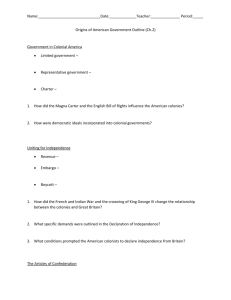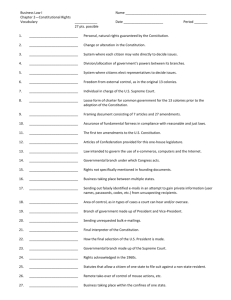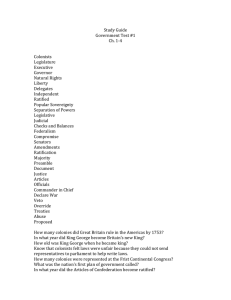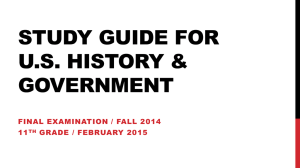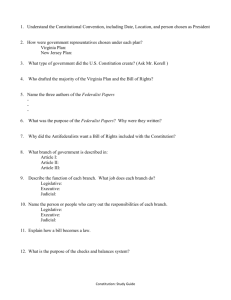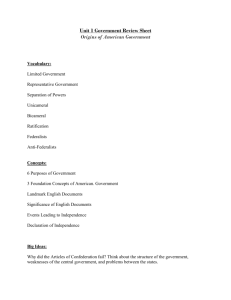Semester Exam Review
advertisement
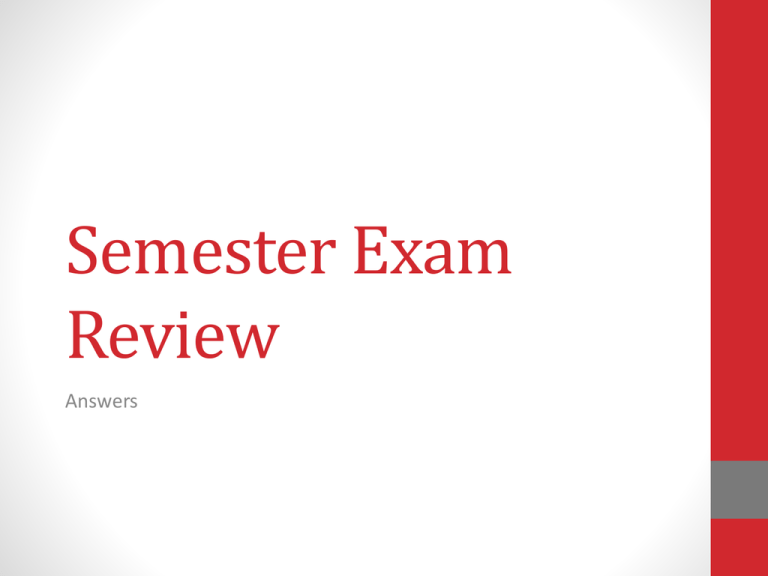
Semester Exam Review Answers Seven Principles of Government Federalism • A federal system divides power between a central government and smaller, local governments • It allows individual states to deal with local problems at the local level– so long as their actions are constitutional. Checks and Balances • Each branch of government has the built in authority and responsibility to restrain the power of the other two branches. This system makes government less efficient, but also prevents tyranny by one branch (p58) Separation of Powers • The constitution assigns specific powers to each of the three branches: • Legislative (Congress) • Executive (President) • Judicial (Supreme Court) Colonization Region Colony Why Founded? New England Rhode Island Religious Freedom By Who? Roger Williams Anne Hutchison Climate Long, cold winters Rocky soil, not good for farming Many forests and rivers Located on the North Atlantic Coast Middle Pennsylvania Religious Freedom Quakers William Penn Very flat, fertile land Mild winters Southern Georgia Founded as a refuge for debtors and convicts James Oglethorpe Mild climate Fertile (rich) Soil Very ling growing season Warm and sunny Maryland Religious freedom Virginia Economic $$$ Lord Baltimore & the Catholics Economy Trade - Fishing - Whaling - Timber - Fur Shipping Subsistence farming ”Breadbasket Colonies” Produced wheat, grain, iron, and dairy Plantation agriculture - Cotton - Rice - Tobacco - Indigo - Sugar cane Jamestown • Founded in 1607 • 1st successful attempt at colonization • Suffered many hardships in the beginning • Ex. Focused on gold instead of growing food, illness, etc. Natural boundaries of the 13 colonies (West) Appalachian Mountains (East) Atlantic Ocean Mayflower Compact • 1620 • Set forth ideas of self – government (self- rule) in the colonies • Written aboard the Mayflower by men before pilgrims landed at Plymouth • Seen as a way to bind themselves to agreed upon laws. Puritans • Emigrated to escape religious persecution • Established Massachusetts Bay Colony, New Hampshire, Connecticut Triangular (Transatlantic) Trade The Middle Passage was the 2nd leg of the trip (from Africa to the West Indies). Slaves were subjected to horrible to horrible conditions & many died. Mercantilism • Britain's policy to control colonial trade & make money for Britain. • “Our corn will fetch its price in any market in Europe, and our imported good must be paid for…” -Thomas Pain, Common Sense, 1776 Raw Materials Colonies Manufactured Goods Mother Country (Britain) Bering Strait Land Bridge • Native American Indians migrated to the Americas from Asia by crossing this bridge. Fundamental Orders of Connecticut • Extended voting rights to non-church members • Limited the power of the governor • Expanded the idea of representative government Road to the Revolution Declaration of Independence • Written in 1776 by Thomas Jefferson • Listed colonial grievances against King George III Writ of Assistance • Search warrant used to search ships for smuggled goods The American Revolution Battle of Yorktown • U.S. victory • Cornwallis became trapped in and surrendered • Ended the American Revolution Battle of Saratoga • Turning point in the war • Benjamin Franklin helps negotiate the Treaty of Alliance with France and Spain Confederation to Constitution Anti- Federalists • Against ratification • Wanted stronger states & more rights for people • Insisted the Bill of Rights be added to the constitution (said it didn’t do enough to protect peoples rights) Virginia Plan • Big states wanted to be based on population • 3 Branches of Government • Legislative Branch would have 2 houses • Houses were based on population Great Compromise • Combined the New Jersey Plan (small state) and Virginia (big state) plans • 3 branches of government • (Bicameral) 2 house legislative branch • Senate based on equality: 2 Senators per state • House of Representatives based on population Articles of Confederation • Held the government together after the American Revolution • Weaknesses • • • • • No chief executive or national court No power to settle disputes between states or make treaties No power to tax, regulate trade, or settle land disputes No international credibility National gov’t and each state allowed to print and coin money • Federal gov’t had very little power! Constitutional Convention 1787 • Constitution was written • Caused by Shay’s Rebellion • When our Founding Fathers got together to discuss problems with the government established after we won the American Revolution • Instead of revising the Articles of Confederation, they ended up writing a totally new system of government, WHICH WE STILL USE TODAY! Constitution • Written in 1787 Amending the Constitution: • 2/3 vote (in both houses) needed to propose an amendment • 3/4 vote (state legislatures) needed to ratify an amendment Shay’s Rebellion • A group of farmers rebelled against the government because of high debt and high state taxes. • America’s leaders realized that an armed uprising of common farmers spelled DANGER for the nation. • This forced those in charge to look at our system of government. • (Under the Articles of Confederation, the national government had little power.) 3/5ths Compromise • Solution for counting slaves in the population for taxes and representation. • Slaves will count as 3/5ths of a person Launching a New Republic George Washington • Wanted the US to follow a foreign policy based on the principle of non-involvement in European affairs (avoid entangling foreign alliances). • Trade was fine, but he wanted US to not get involved with anything happening across the ocean or we might get pulled into their problems • Warned against creating political parties • It would split the people into factions(groups) against each other instead of everyone working for the good of the United States. • Warned against taxing the American people too heavily. • He felt the people would not soon forget what Britain had done to the colonies with taxes and that we should be careful not to repeat the same mistakes. • Washington set many precedents as President! • Ex. Creating a cabinet, serving two 4 year terms, etc. Alexander Hamilton • • • • Federalist – wrote many Federalist Papers Believed the US should be Urban Wanted strong Federal Government 1st Secretary of State Creation of Political Parties Thomas Jefferson Democratic - Republicans Alexander Hamilton Federalists • Weak national government • Strong state governments • Strict construction (interpretation) of the Constitution • Against the national bank • Economy based on farming • Supporters: farmers, tradespeople • Strong national government • Weak state governments • Loose construction (interpretation) of the Constitution • For the national bank • Economy based on manufacturing and shipping • Supporters: lawyers, merchants, manufacturers, clergy Landmark Court Cases Marbury v. Madison (judicial review) • Allowed the Supreme Court to decide if a law passed by Congress is Unconstitutional • Unconstitutional: If a law is made that says something that goes against something the constitution says, it is considered “unconstitutional” • The Constitution is the SUPREME LAW OF THE LAND so it must come before ANY OTHER LAWS • This power is called the principle of Judicial Review (the judges can review!) John Marshall • 4th Chief Justice of the Supreme Court • (almost single-handedly) gave new power to the Constitution • Established 3 Principles • Principle of judicial review • Supreme Court had the power to set aside laws of state legislatures • Supreme Court had the power to reverse decisions of state courts • Constitution should be treated as a “living” document Louisiana Purchase & War of 1812 Louisiana Purchase • • • • Purchased in 1803 by Thomas Jefferson Doubled the size of the U.S. 800,000 sq. mi. for three cents per acre We were guaranteed the Mississippi waterway to the Gulf of Mexico which included New Orleans • Paved the way for the westward expansion of the United States Causes and effects of the War of 1812 • Causes • British sailors kidnapped our sailors and ships and MADE them enter the British Navy (Impressment) • British interfere with American shipping and trade • War blocked British goods from being imported • Effects • Renewed patriotism and love for the USA! • Weakened Native American resistance • Increased American manufacturing because we started refusing to buy British goods.
